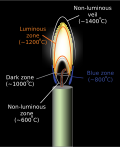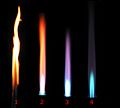Flame: Difference between revisions
CSV import |
CSV import |
||
| Line 43: | Line 43: | ||
[[Category:Medicine]] | [[Category:Medicine]] | ||
{{dictionary-stub1}} | {{dictionary-stub1}} | ||
== Flame == | |||
<gallery> | |||
File:DancingFlames.jpg|Dancing Flames | |||
File:Anatomy_of_a_candle_flame.svg|Anatomy of a Candle Flame | |||
File:Spectrum_of_blue_flame_-_intensity_corrected.png|Spectrum of Blue Flame - Intensity Corrected | |||
File:Bunsen_burner_flame_types.jpg|Bunsen Burner Flame Types | |||
File:Candlespace.jpg|Candle Space | |||
File:Electric-candle-flame.jpgA_candle_flame_strongly_influenced_and_moved_about_by_an_electric_field_due_to_the_flame_having_ions.]_(archived_30_September_2011)|Electric Candle Flame | |||
</gallery> | |||
Latest revision as of 21:36, 23 February 2025
Flame is a visible, gaseous part of a fire. It is caused by a highly exothermic reaction (for example, combustion, a self-sustaining oxidation reaction, usually initiated by heat, producing light and heat), or a nuclear reaction (such as atomic fission, atomic fusion, or radioactive decay).
Characteristics[edit]
A flame's color depends on the temperature and the material being burned. The flame's temperature is usually measured in Kelvin (K). The color can range from a deep red, through orange, yellow-white, to a blue-white, although it can also be colorless.
Types of Flames[edit]
There are different types of flames, including:
- Diffusion flame: This is the most common type of flame and is caused by the combustion of gases.
- Premixed flame: This type of flame occurs when the oxidizer and fuel are mixed before ignition.
- Flameless combustion: This is a form of combustion that occurs when fuel and an oxidizer are combined at a temperature below the autoignition temperature.
Flame Temperature[edit]
The temperature of a flame can vary depending on the substance being burned and the type of flame. For example, a candle flame typically has a temperature of around 1400 K, while a Bunsen burner flame can reach temperatures of up to 1600 K.
Flame Color[edit]
The color of a flame can provide information about its temperature. A red flame is usually around 1000 K, an orange flame is around 1200 K, a white flame is around 1500 K, and a blue flame is over 1600 K.
Flame in Medicine[edit]
In medicine, flames are used in various procedures, such as sterilization of medical instruments. The high temperature of the flame kills bacteria and other microorganisms, making the instruments safe for use.
See Also[edit]
References[edit]
<references />








